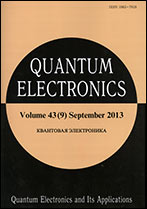|
Influence of the pumping conditions on the level of population inversion in neodymium glass
R. G. Vdovchenko, V. P. Kirsanov, Yu. I. Kruzhilin, S. V. Troshkin, V. A. Ryabinkina
Abstract:
The energy and time characteristics of the luminescence of GLS-1 glass were investigated using pump pulses of 100–1300 μsec duration. The maximum population inversion was obtained for 300 μsec pump pulses. A method was developed for estimating the specific energy accumulated by an active material in a laser.
Received: 17.12.1975
Citation:
R. G. Vdovchenko, V. P. Kirsanov, Yu. I. Kruzhilin, S. V. Troshkin, V. A. Ryabinkina, “Influence of the pumping conditions on the level of population inversion in neodymium glass”, Kvantovaya Elektronika, 3:8 (1976), 1710–1714 [Sov J Quantum Electron, 6:8 (1976), 925–927]
Linking options:
https://www.mathnet.ru/eng/qe11786 https://www.mathnet.ru/eng/qe/v3/i8/p1710
|


| Statistics & downloads: |
| Abstract page: | 122 | | Full-text PDF : | 72 |
|





 Contact us:
Contact us: Terms of Use
Terms of Use
 Registration to the website
Registration to the website Logotypes
Logotypes








